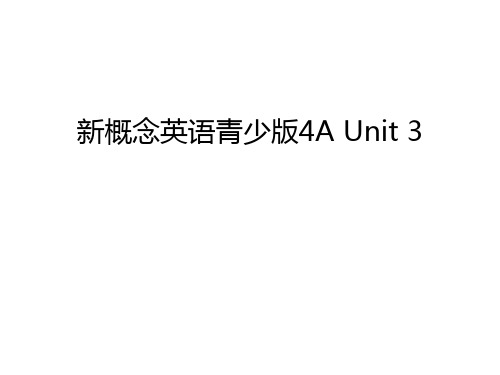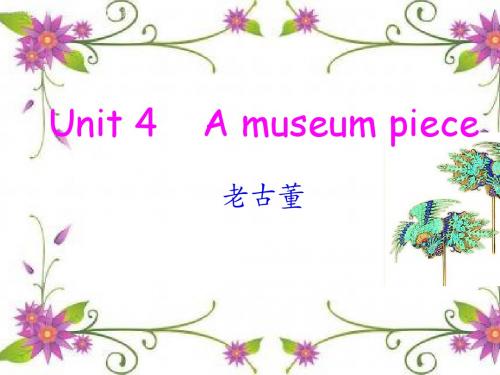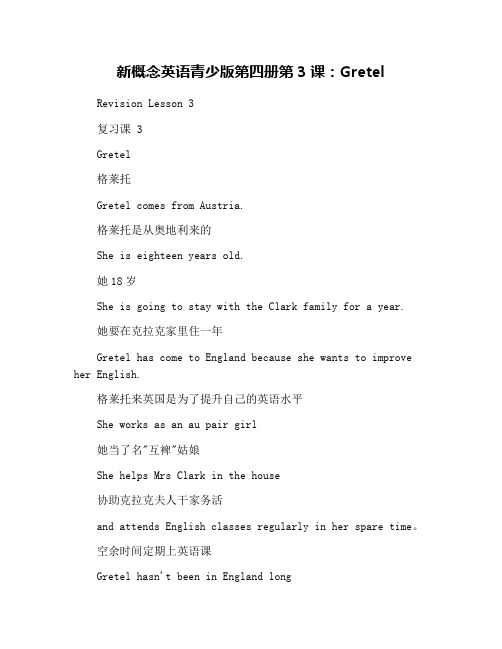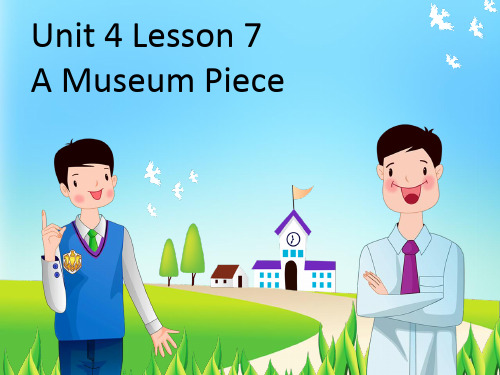新概念青少年版Unit4.3A
新概念英语青少版4A Unit 3备课讲稿

Talk about you
• What kinds of things can spoil a holiday? • What is your ‘dream holiday’?
Expressions
missed some classes last term 上个学期错过很多课 catch flu 患了流感 lent David a pencil 借给大卫一支铅笔 sent Kate a letter 寄给凯特一封信 give the money to her sister
Listening and Understanding
I spent the whole day in my room, but I did not write a single card!
Guided Conversation
1. Italy. 2. Museums. 3. In public gardens. 4. Yes, I did. 5. A friendly writer did. 6. Every day. 7. Yes, they did. 8. No, they didn’t. 9. I made a big decision.
Guided Conversatier’s holidays. He spent his holidays in Italy last summer. He thought about postcards every day. He did not send any cards to his friends. He bought thirtyseven cards on the last day. He stayed in his room all day. He did not write any cards.
新概念青少年版Unit4.3A

noise 名词 噪音
noisy 形容词 有噪声的
Robert: What can you do with it?
William: Good question! It’s just a museum piece (古董), really.
It’s got= it has got (has got 有)
crazy
.
• 5.我们可是过了一个漫长的早晨。 • We have already had a long morning!
• • • • • • •
attic阁楼,顶楼 hard disk硬盘 lawnmower割草机 megabyte兆字节 jet喷气式飞机 circus马戏团 funfair游乐场
find - found 发现
Robert: Mum found it in a box in the attic(阁楼). William: Oh, then it’s mine! It’s been there for years. Mine =
my thing
It’s been = it has been 现在完成时 have/has +动词过去分词
Unit 4
A museum piece
老古董
What’s missing?
farm
market
worry
board
text
What’s missing?
kettle
still
home country
in time
on time
What’s missing?
have a good time
have fun
新概念英语青少版第四册第3课:Gretel

新概念英语青少版第四册第3课:Gretel Revision Lesson 3复习课 3Gretel格莱托Gretel comes from Austria.格莱托是从奥地利来的She is eighteen years old.她18岁She is going to stay with the Clark family for a year.她要在克拉克家里住一年Gretel has come to England because she wants to improve her English.格莱托来英国是为了提升自己的英语水平She works as an au pair girl她当了名"互裨"姑娘She helps Mrs Clark in the house协助克拉克夫人干家务活and attends English classes regularly in her spare time。
空余时间定期上英语课Gretel hasn't been in England long格莱托到英国时间不长.对她来说,什么事都很新鲜and everything is strange to her.对她来说,什么事都很新鲜She often compares life in London with life in Vienna.她常比较伦敦和维也纳的生活Some things are nicer in London;有些方面,伦敦好些other things are not so nice.有些方面,就不很理想了For instance,举例说吧the shops are bigger in London than in Vienna and there is greater variety伦敦的商店大一些品种也丰富些But it's more expensive to enjoy yourself in London.不过在伦敦要玩得高兴就贵些It's expensive to have a meal at a restaurant or to go to a theatre.上饭馆,看戏都很贵Gretel has got used to many things already格莱托对好多事情已经习惯了but she can't get used to breakfast in England.不过对英国的早餐还不习惯"You English eat so much in the morning," she often says.她常说:"你们英国人早上吃这么多!""Fruit juice,porridge,bacon and egg,tea,toast and marmalade!"水果汁、稀饭、咸肉加鸡蛋、茶、烤面包和果酱How can you face all that food so early in the day?"你们一大早怎么吃下这么多东西?。
新概念青少版3A_unit_4(共34页)

Museum 博物馆
museum piece 古董
What’s this?
PC = Personal Computer It’s an Apple 2.
第一台个人电脑是apple公司制造的 Apple(苹果电脑) 是美国著名老牌计算机公司,成立于1977年,是个人电 脑最早的倡导者和著名生产商。它所生产的苹果系列电 脑,包括iMac,PowerMac,ibook,Powerbook等产品 线的众多硬件产品,一直是个人电脑市场的主流产品之 一,并曾提出过很多新概念,其产品也掀起过多次流行 潮,风行一时。。目前,苹果电脑电脑公司在全球几十 个国家建立了分公司或代表机构,其产品也行销全世界.
Homework
• 1. 看DVD第4单元,并跟读; 2. P28单词每个抄写一遍,朗读三遍并记忆, 要求会默;背诵26-27的任选三段课文。 4. 练习册做Unit4部分。
It’s only got five Megabytes’ (兆) hard disk space (空间). Robert: Five Megabytes! That’s nothing! (太微不 足道了)
William: I know.
is – was 过去式 buy – bought
It was already a museum piece when I bought it, and that was a long time ago. Maybe (也许) I’m a museum piece now, too!
when I bought it 当我买它的 时候 (过去时间, 用过去时)
a long time ago 很久以前 (过去时 间,用过 去时)
青少版新概念4英语标准教案-U4

《青少版新概念4英语》教案一、教学内容Unit 4 An exciting trip二、教学目标重点句子:带有现在完成时的句子重点单词:receive/firm/different/centre/abroad/exciting重点语法:掌握现在完成时及其可连用的时间状语、动词过去分词、现在完成时与一般过去时的区别。
I. Revision (Unit3)Step1: Warm up/ActivityStep2: Review the key words and sentencesStep3: Recite the textStep4: DictationII. Leading in/Free talkThe people in western countries love traveling aboard. Travel is one kind of activity and an important part of their life. Most people usually travel during their yearly holiday. Traveling now is also more and more popular in China. Which city/country have you ever been to? When you are on holiday, do you like to travel aboard? Why or why not?III. Picture glance→Q1:What has the writer just received from his brother?(Pic1) a letter→Q2: What does Tim do?(Pic2) engineer→Q3: How long has he been in Australia? (Pic2) six months→Q4: Has he already visited many places or not? (Pic2) Yes→Q5: Where is he now? (Pic2) Australia→Q6: Has Tim ever been abroad before or not? (Pic4) No→Q7: Is he enjoying his trip very much? (Pic4) YesIV. ListeningStep1:Watch the video and answer questions about the text.Step2:Watch the video and ask questions about the text.Step3:ImitationStep4: Retell the story with the key wordsV. Words and expressionsreceive v. 接受,收到↘receive sth. from…firm n. 商行,公司adj. 坚固的↘company 公司centre n. 中心↘middle 中部in the middle of 在…的中间abroad adv. 在国外↘go aroad 去国外live abroad 国外定居study abroad 国外学习different adj. 不同的↘difference n. 差别↘be different from & the same asexciting adj. 令人兴奋的↘excite v. 刺激,兴奋,激动->excited : adj 兴奋的,激动的(brainstorm: interesting; relaxing; boring; disappointing...)注意区分:-ed: 自己感到/ -ing:令人感到e.g. exciting boy The news is exciting.I am excited. The news excited me.work for 在…上班、任职work in 强调地点work for强调work work as 强调职业VI. Grammar focus:1. Find the sentences of present perfect in the text.A. I have just received a letter from my brother.B. He has never been abroad before.现在完成时的动词结构have/has + done (动词的过去分词)2. 为什么用现在完成时?1) 表示过去对现在的影响A句潜在意思: I’m reading the letter or now I can tell you the content of the letter.2) 时间状语是时态的标志,有时助动词have或has间会加入时间副词,如just, never, so far, already, ever, etc. 或者在句尾或句首,会有for + 一段时间, since + 时间点, so far, etc. 此时,动作不一定完成。
新概念英语青少版3A Unit 4

Grammar
Has/have been in + 地点 + for + 时间段/ since + 时间点
Has/have gone to + 地点 + for + 时间段/ since + 时间点
Ten Minutes Break
Review for Homework
Turn to Page 8 3. A: B: A: B: A: B: Where’s Jack? He’s gone to Mexico. When did he go there? He went there a month ago. When’s he going to come back? Next Saturday.
4. A: Where’s Bob? B: He’s at home now. He’s been to China. He’s just come back. A: Lucky man! I’ve never been to China. 5. 6.
Review for Homework
Turn to Page 9
Pattern Practice
Exercises
Page 33 Write Questions 1. Has he been to work today? 2. Where is Paul? 3. Have you been there? 4. Have you been to London? 5. Would you like something to eat?/ Would you like to eat a sandwich? 6. Where is your sister? Multiple Choice A B C C D
新概念英语青少版入门级AUnit4
a boy
a girl
a sun
a moon
a desk
a table
an umbrella
an apple egg insect orange
男孩
a boy
太阳 桌子 伞
a sun a table
an umbrella
WATCH DVD LESSON 1
×
×
×
×
×
Lesson 2
Unit 4 Thank you, Mum!
Review the letters
an insect an egg a cat a a a jelly girl a pig kite hat an a a a apple fish ball dog
blue
green
red
yellow
Say the colors. ___and ___.
an apple
an egg
an orange
an insect
a dog
a cat
a pig
a fish
a girl
a kite
a jelly
a hat
a ball
colours:
a red and green umbrella
Review
a boy the sun a table
a girl
the moon
an umbrella
a boy and a girl
the moon and the sun
a pig and a cat
ቤተ መጻሕፍቲ ባይዱ
an apple and an orange
an umbrella and a table
新概念青少年版入门级A-Unit 4 课件
Table 英 [ˈteɪbl] n. 桌子;表格;平地层 vt. 制表;搁置;嵌合 adj. 桌子的
常用搭配: on the table 在桌面上;公开地 under the table 酒醉;秘密地 table tennis 乒乓球;桌球 at table 在餐桌边,在进餐 at the table 吃饭时;在谈判中 dining table 餐桌 clear the table 收拾桌子,收拾饭桌 coffee table 咖啡桌;咖啡茶几
Boy [bɔɪ] n. 男孩;男人
常用搭配: little boy 小男孩 boy friend 男朋友 big boy 大亨,大人物 baby boy 男婴;小男孩 bad boy 坏男孩;不良少年 handsome boy 帅小伙 pretty boy 漂亮男孩;脂粉气十足的男人;矫揉造作的男子 new boy 新来的男孩;新人 golden boy 有成就的男人 office boy 小弟;工友
King 英 [kɪŋ] n. 国王;最有势力者;王棋 vi. 统治;做国王 vt. 立…为王 adj. 主要的,最重要的,最大的
martin luther king n. 马丁·路德·金(美国黑人运动领袖) monkey king 美猴王,孙悟空 king arthur 亚瑟王(电影名,是英格兰传说中的国王) king lear 李尔王 king of kings 万王之王(耶稣基督);上帝
--Oh,the sun! 哦,太阳!
--Look! An umbrella and a table! --Oh! A red and green umbrella!
看!一顶阳伞和一张桌子! 哦!一顶红色和绿色的阳伞!
--Thank you,Mum! 谢谢您,妈妈!
青少版新概念3A Unit4 单元测试卷
Unit 4 单元测试卷一、单选( ) 1. It came onto the market _____ 1977.A. inB. onC. atD. /( ) 2. It _____ like a lawnmower..A. tastesB. soundsC. smellsD. has( ) 3. Where _____ you find it?A. doB. isC. doneD. did( ) 4. What can you _____ _____ it?A. do withB. doing withC. did withD. done with( ) 5. It hasn’t _____ out of its box for twenty years!A. beenB. goneC. goD. is二.短语翻译1. 听起来像…________________________2. 很久以前________________________3. In fact, it’s been there since we moved into this house! _______________________________4. It was already a museum piece when I bought it. __________________________________5. Has Jack already gone to the States? __________________________________三. 阅读理解Mingming and Qinqin are twin brothers. They are twelve years old. They are in the same class, the same grade, and the same school. They wear the same clothes. Both of them are very good students. Their teachers and classmates like them very much.These two brothers are good at sports. They are members of the school football team. They also like drawing pictures, practicing calligraphy and playing the guitar. Sometimes they play games with their uncle. Their uncle is a policeman. They like him very much. Their uncle like them, too. They often ask their uncle to tell stories to them.But there are some differences between this twin brothers. Mingming is taller and always has a lot of things to talk about. Qinqin is just a little bit shorter than his brother. When his brother is talking, Qinqin will just listen. The two brothers are very kind-hearted. They often help their mother do some housework. They like to help other people.阅读短文,从A,B,C,D四个选项中选择一个正确答案填空。
青少版新概念4英语标准教案-U3
《青少版新概念4英语》教案一、教学内容Unit 3 Please send me a card二、教学目标重点句子:带有一般过去时的句子重点单词:spoil/friendly/lend/decision/whole/single/Italy/public重点语法:复习一般过去时、动词过去式、直接宾语和间接宾语I. Revision (Unit1-2)Step1: Warm up/ActivityStep2: Review the key words and sentencesStep3: Recite the textStep4: DictationII. Leading in/Free talkLet’s talk something about your holiday. How did you spend your last holiday? Where did you go? Did you have a good time? Why? What kinds of thing can spoil your holiday? For example, the terrible weather can spoil a holiday. And the text, postcards always spoil the writer’s holiday.III. Picture glance→Q1: What does always spoil the writer’s holiday?(Pic1)Postcards→Q2: Where did he spend his holidays last summer? (Pic1) Italy→Q3: Where did he visit and sit? (Pic1) Museum and public garden→Q4: Who taught him Italian? (Pic2) A friendly waiter→Q5: What did he think about every day? (Pic3) Postcards→Q6: How many cards did he buy? (Pic3)Thirty-seven→Q7: Did he write any postcards? (Pic4) NoIV. ListeningStep1:Watch the video and answer questions about the text.Step2:Watch the video and ask questions about the text.Step3:ImitationStep4: Retell the story with the key wordsV. Words and expressions1.spoil(spoiled or spoilt):使索然无味, 损坏(重点词)n宠坏His parents spoiled the boy.毁了某人心情. His arrival spoiled my hoilday.比较:break: 打破; break the windows 打破玻璃damage: 破坏, 程度不一定很重destroy : 破坏, 彻底摧毁以上三个是指物理上的破坏, 而spoil主要指精神上,spoil: 把东西的质量变得不好; 生活中不顺心的事;宠坏, 溺爱。
- 1、下载文档前请自行甄别文档内容的完整性,平台不提供额外的编辑、内容补充、找答案等附加服务。
- 2、"仅部分预览"的文档,不可在线预览部分如存在完整性等问题,可反馈申请退款(可完整预览的文档不适用该条件!)。
- 3、如文档侵犯您的权益,请联系客服反馈,我们会尽快为您处理(人工客服工作时间:9:00-18:30)。
情态动词+动词原形
• can, must, may 等都是情态动词,不能独立 做谓语,需和实义动词连用。变一般疑问 句时将情态动词直接提前至句首。 • I can open the box. (变一般疑问句) • Can you open the box?
Robert: Is that noise (噪音) the hard disk? It for + 时间段 sounds like a lawnmower (割草机)! William: It is noisy (吵闹的,嘈杂的)! It hasn’t been out of its box for twenty years!
when I bought it 当我买它的 时候 (过去时间, 用过去时)
a long time ago 很久以前 (过去时 间,用过 去时)
现在完成时:延续性动词
• Homework
1.背诵U4一二三段(或四五六段)
2.背诵P28单词
find - found 发现
Robert: Mum found it in a box in the attic(阁楼). William: Oh, then it’s mine! It’s been there for years. Mine =
my thing
It’s been = it has been 现在完成时 have/has +动词过去分词
In fact, it’s been there since we moved into this house!
现在完成时:
• Have/has + 动词过去分词
• 表示动词发生在过去,持续到现在或对现 在产生影响,后接表示延续性的时间状语。 • 如: for+ 时间段 • since+ 时间点 since 1998. • I have been to America _______ • I have got the car _______ for five years.
It’s only got five Megabytes’ (兆) hard disk space (空间). Robert: Five Megabytes! That’s nothing! (太微不 足道了)
William: I know.
is – was 过去式 buy – bought
It was already a museum piece when I bought it, and that was a long time ago. Maybe (也许) I’m a museum piece now, too!
sound like 听 起来像
noise 动、名词 噪音
noisy 形容词 有噪声的
Robert: What can you do with it?
William: Good question! It’s just a museum piece (古董), really.
It’s got= it has got (has got 有)
the first 第一 the second 第二 the third 第三
PC: personal computer 个人电脑
Robert: What’s this, Dad? William: It’s Apple 2. It’s a very early computer. In fact (事实上), it’s the first Personal Computer, ever(曾经). It came onto the market(面世) Where 特殊疑 in 1977. Where did you find it?
问词,在哪
第一台个人电脑是apple公司制造的 Apple(苹果电脑)是美国著名老牌 计算机公司,成立于1977年,是个人 电脑最早的倡导者和著名生产商。它 所生产的苹果系列电脑,包括iMac, PowerMac,ibook,Powerbook等产品 线的众多硬件产品,一直是个人电脑 市场的主流产品之一,并曾提出过很 多新概念,其产品也掀起过多次流行 潮,风行一时。。目前,苹果电脑电 脑公司在全球几十个国家建立了分公 司或代表机构,其产品也行销全世界.
museum piece
museum piece
museum piece
拓展:比喻人的惯用语
应声虫——比喻随声附和的人。 吸血鬼——比喻残酷欺压人的人。 眼中钉——比喻令人头疼的人。 墙头草——比喻立场不坚定,左右摇摆的人。 变色龙——比喻见风使舵的人。 吹鼓手——比喻鼓吹某事或吹捧某人的人。 半瓶水——比喻学识很浅却夸夸其谈的人。 纸老虎——比喻外强中干的人。 井底蛙——比喻目光短浅的人。 老黄牛——比喻默不作声、踏实工作的人。 睁眼瞎——比喻没有一点儿学识的人。 软豆腐——比喻性格十分脆弱的人。 地头蛇——比喻在某一地方仗势欺压人的人。 铁公鸡——比喻吝啬钱财一毛不拔的人。 长舌妇——比喻喜好搬弄是非的人。 传声筒——比喻没有主见专会鹦鹉学舌的人。 老油条——比喻很世故很油滑的人。 老古董——比喻思想陈旧的人。 替罪羊——比喻代人受过的人。
Unit 4
A museum piece
1
2
3
4
5
6
end
0
2
3
4
5
6
end
1
3
3
4
5
end
1
2
10
4
5
6
end
1
2
3
2
5
6
end
1
2
3
4
5
6
end
1
2
3
4
5
7
end
museum piece
museum piece
museum piece
museum piece
museum piece
since Sunday ten o’ clock last weekend
for
1996 January since for
Can 是情态动词,表 示能够,有能力做 某事。 Can + 动词的原形, 变一般疑问句时将 Can提前至句首。
Robert: Does it still(仍然) work? William: I don’t know…… Ah, there you are! Can you hear the hard disk(硬盘)?
